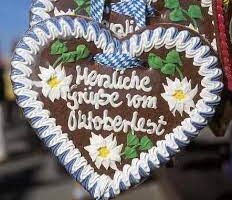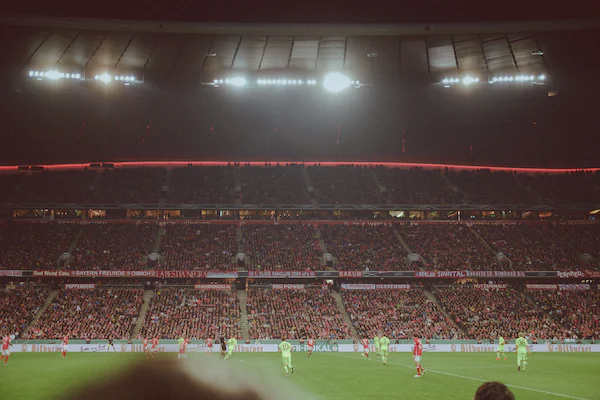
Football Fever in Germany!
The role of football can be gauged by the epochal truce, a brief hiatus in the War that witnessed a football game between German and British soldiers on Christmas Day in World War I in 1914. It truly was a lesson in cooperation, acceptance and friendship for the world. The DFB or German Football Association was formed on 28 January 1900 in Leipzig. It plans to launch mobile phone apps for providing information regarding new events, cheap offers on tickets and seating arrangements in matches. 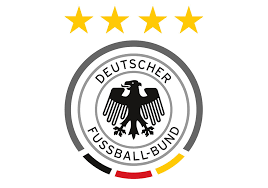 The DFB’s aim is to achieve optimum performance from the players. They have established base camps to nurture young talent. Training includes personal development, focus, increased concentration, controlled breathing, facing stress on the field, skills like anticipation, combativeness, attention to detail and expertise in running. Talent development and training of coaches and players attract huge investments. Patriotism and nationalism are intertwined with German national football. A country that had racial issues and violent historical precedence found respect and admiration through the laurels obtained from its national football game. The teams play not just to win but their purpose is to make their nation proud by playing with dedication and placing Germany in a prestigious position. To truly understand Germany’s passion for Football games you have to be a spectator at one of the matches in a stadium with crowds cheering and singing together. It is an intensely emotional experience you will always cherish watching your favourite players out there on the field just within reach. All will feel the energy around them and many will be seen crying or laughing with faces and T-shirts painted with national colours. A wave of jubilation and passion engulfs the crowd. German flags flutter evoking a feeling of oneness amongst all the people of the nation. Germany’s premier football league – the “Bundesliga” means federal league. It consists of 18 teams. The league functions on promotion and relegation. Teams based on how they performed are transferred to leagues above and below.
The DFB’s aim is to achieve optimum performance from the players. They have established base camps to nurture young talent. Training includes personal development, focus, increased concentration, controlled breathing, facing stress on the field, skills like anticipation, combativeness, attention to detail and expertise in running. Talent development and training of coaches and players attract huge investments. Patriotism and nationalism are intertwined with German national football. A country that had racial issues and violent historical precedence found respect and admiration through the laurels obtained from its national football game. The teams play not just to win but their purpose is to make their nation proud by playing with dedication and placing Germany in a prestigious position. To truly understand Germany’s passion for Football games you have to be a spectator at one of the matches in a stadium with crowds cheering and singing together. It is an intensely emotional experience you will always cherish watching your favourite players out there on the field just within reach. All will feel the energy around them and many will be seen crying or laughing with faces and T-shirts painted with national colours. A wave of jubilation and passion engulfs the crowd. German flags flutter evoking a feeling of oneness amongst all the people of the nation. Germany’s premier football league – the “Bundesliga” means federal league. It consists of 18 teams. The league functions on promotion and relegation. Teams based on how they performed are transferred to leagues above and below.
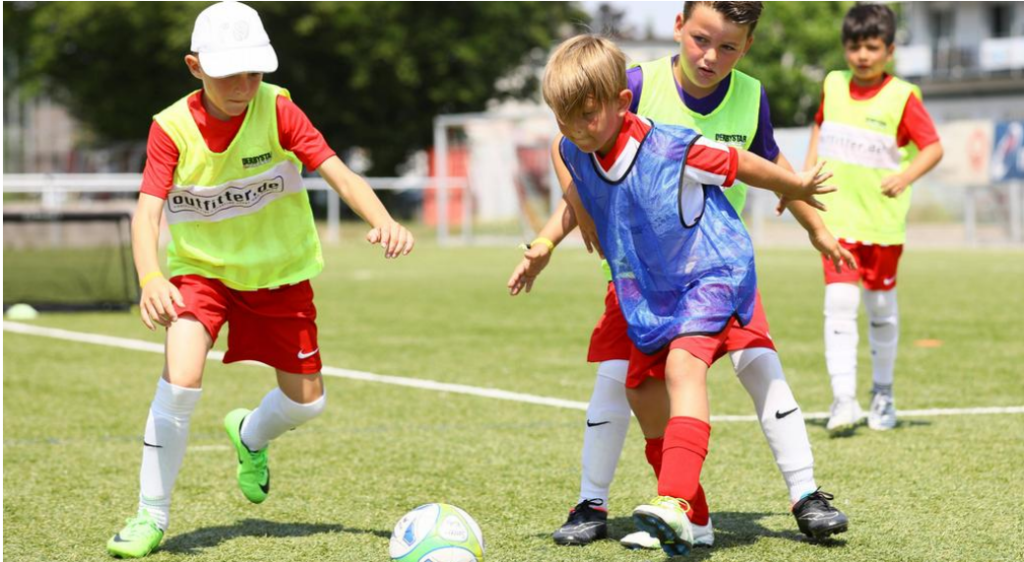 Source:http://www.germantownlegendssoccer.com
Source:http://www.germantownlegendssoccer.comPlayers like Mario Götze, Julian Draxler and Christoph Kramer are very talented. Matthias Lochmann is a sports scientist behind the implementation of “Funiño” or Mini Football in Germany for opening the path for new talent. The men’s national football team in Germany – “the Mannschaft” has been represented in international competition since 1908. It is governed by the German Football Association founded in 1900. Success is because of training, unending preparation, and discipline. The teams fight until the last moment in matches. Emphasis is given to dedicated teamwork rather than individual achievement. Apart from well-trained star players, committed volunteers actively work to achieve national football goals. People animatedly discuss the games played by their favourite clubs even at work. Media and fans bestow tremendous attention on their performances. The DFB provides great support to amateur clubs too. 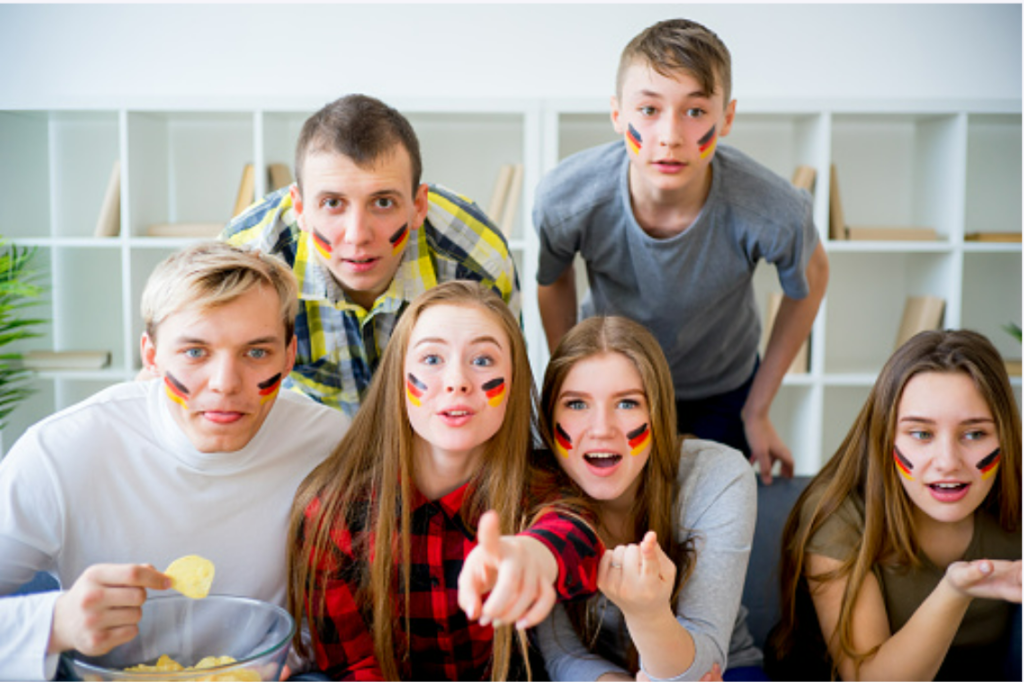 Jürgen Klinsmann trained players from years 2004 to 2006. Jogi Löw was a head coach for 8 years. Löw was involved in developing team spirit and inspiring the Mannschaft. Media and public opinion see players as representatives, embodying and projecting messages about national values and qualities across the globe. Many immigrants from different nations like Africa, Turkey, and Poland form Germany’s national football team. German coaches gathered knowledge from various foreign teams also. The German team has always been humble, spent as much time as possible and interacted with the public. They gained self-confidence, respect and support. The extent of enthusiasm for football events is evident by witnessing big screen displays hosted by restaurants and beer bars to provide enjoyment to the public. In Germany celebrations of winning are by sharing beer, not champagne. Notable players include Thomas Müller, Manuel Neuer, Mesut Özil and Philip Lahm.
Jürgen Klinsmann trained players from years 2004 to 2006. Jogi Löw was a head coach for 8 years. Löw was involved in developing team spirit and inspiring the Mannschaft. Media and public opinion see players as representatives, embodying and projecting messages about national values and qualities across the globe. Many immigrants from different nations like Africa, Turkey, and Poland form Germany’s national football team. German coaches gathered knowledge from various foreign teams also. The German team has always been humble, spent as much time as possible and interacted with the public. They gained self-confidence, respect and support. The extent of enthusiasm for football events is evident by witnessing big screen displays hosted by restaurants and beer bars to provide enjoyment to the public. In Germany celebrations of winning are by sharing beer, not champagne. Notable players include Thomas Müller, Manuel Neuer, Mesut Özil and Philip Lahm. 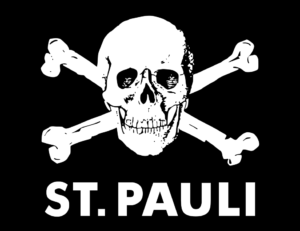
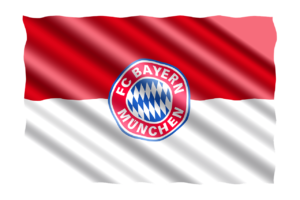
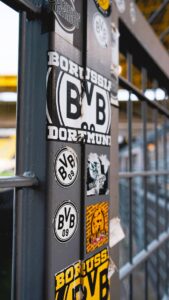 Borussia Dortmund club was founded in 1909, famous for its attacking mode of football and large numbers of fans. It is a rival to FC Schalke 04 club. FC Bayern Munich was founded in 1900 by 11 football players, led by Franz John. It plays in the Bundesliga. It has won several national titles. Famous footballers of this club are Sepp Maier, Franz Beckenbauer and Manuel Neuer. FC Energie Cottbus is a football club founded in East Germany in 1963 and based in Cottbus, Brandenburg. After the German reunification, it was one of the few teams which played successfully in the country’s professional football. St Pauli’s symbol is pirate skull-and-crossbones. It has left-wing and LGBT supporters. About 41.4 per cent of the club’s fans are female. FC Schalke 04, is a successful German football club that plays in Gelsenkirchen. Its various departments include football, basketball, table tennis, handball and athletics. RB (Rasenballsport) Leipzig club was founded in 2009. About 99 per cent is owned by the Red Bull corporation. It played in the Champions League. In Germany, clubs are owned by club members and fans – the “50+1 model”. Opposition fan groups argue that those who attend the matches are groups who want to spend a delightful weekend not die-hard fans. RB Leipzig’s director Ralf Rangnick has worked towards nurturing budding young talent. The Freiburg club was founded in 1904. Volker Finke was its coach from 1991 to 2007. The German coach Joachim Löw is their famous player. Christian Streich has been a magnetic coach but known for his eccentricity since 2011. Players who were coached by him are Vincenzo Grifo, Max Kruse and Maximilian Philipp. Nils Petersen is a striker for the club and the German national team. The football stadiums in the GDR in the 1980s were in very poor conditions with undeveloped sports facilities. German unification on 3 October 1990 brought about a great change in the football facilities. FC Hansa Rostock is a German association football club based in the city of Rostock. It established itself in the Bundesliga during the 1990s. It’s a successful club from former East Germany. The club flourished under coach Joachim Streich. Sixteen youngsters who had won a competition got together and founded Werder Bremen club in 1899. The HSV with its base in Hamburg in 1950 was the first German team to tour the United States after World War II. It won three national cup finals and six national championships in the European Champion Clubs’ Cup. Other German Football Clubs include Borussia Mönchengladbach, Hertha BSC, FC Kaiserslautern, 1. FC Köln, TSV 1860 Munich, 1. FC Union Berlin.
Borussia Dortmund club was founded in 1909, famous for its attacking mode of football and large numbers of fans. It is a rival to FC Schalke 04 club. FC Bayern Munich was founded in 1900 by 11 football players, led by Franz John. It plays in the Bundesliga. It has won several national titles. Famous footballers of this club are Sepp Maier, Franz Beckenbauer and Manuel Neuer. FC Energie Cottbus is a football club founded in East Germany in 1963 and based in Cottbus, Brandenburg. After the German reunification, it was one of the few teams which played successfully in the country’s professional football. St Pauli’s symbol is pirate skull-and-crossbones. It has left-wing and LGBT supporters. About 41.4 per cent of the club’s fans are female. FC Schalke 04, is a successful German football club that plays in Gelsenkirchen. Its various departments include football, basketball, table tennis, handball and athletics. RB (Rasenballsport) Leipzig club was founded in 2009. About 99 per cent is owned by the Red Bull corporation. It played in the Champions League. In Germany, clubs are owned by club members and fans – the “50+1 model”. Opposition fan groups argue that those who attend the matches are groups who want to spend a delightful weekend not die-hard fans. RB Leipzig’s director Ralf Rangnick has worked towards nurturing budding young talent. The Freiburg club was founded in 1904. Volker Finke was its coach from 1991 to 2007. The German coach Joachim Löw is their famous player. Christian Streich has been a magnetic coach but known for his eccentricity since 2011. Players who were coached by him are Vincenzo Grifo, Max Kruse and Maximilian Philipp. Nils Petersen is a striker for the club and the German national team. The football stadiums in the GDR in the 1980s were in very poor conditions with undeveloped sports facilities. German unification on 3 October 1990 brought about a great change in the football facilities. FC Hansa Rostock is a German association football club based in the city of Rostock. It established itself in the Bundesliga during the 1990s. It’s a successful club from former East Germany. The club flourished under coach Joachim Streich. Sixteen youngsters who had won a competition got together and founded Werder Bremen club in 1899. The HSV with its base in Hamburg in 1950 was the first German team to tour the United States after World War II. It won three national cup finals and six national championships in the European Champion Clubs’ Cup. Other German Football Clubs include Borussia Mönchengladbach, Hertha BSC, FC Kaiserslautern, 1. FC Köln, TSV 1860 Munich, 1. FC Union Berlin.



